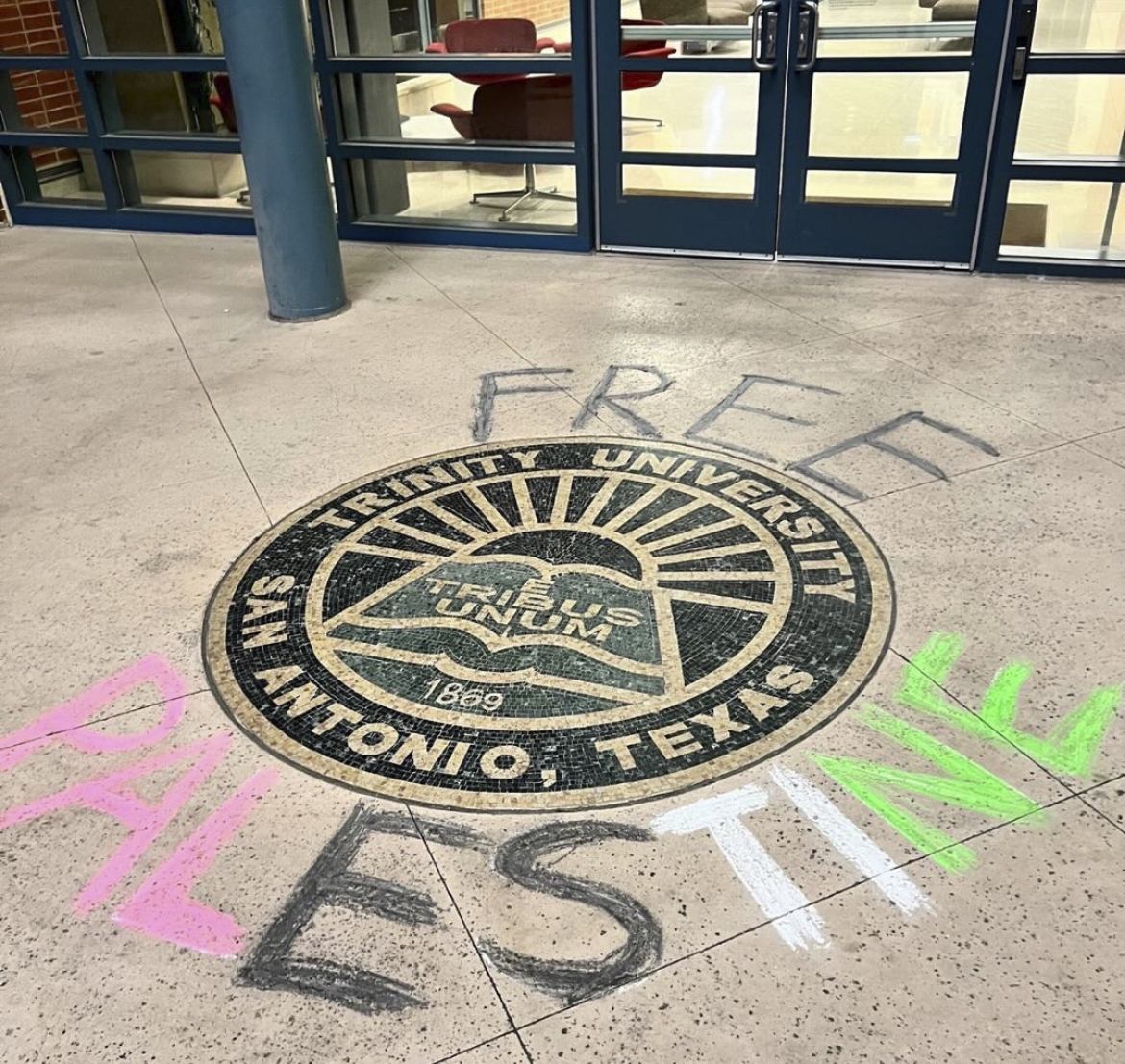Those scrolling through social media or walking to their first early morning classes of the semester may have encountered one of the multiple displays of sidewalk chalk across campus promoting support for Palestine. Drawn by students the night of Jan. 9 and washed away by facilities services before 10 a.m. the next morning, the chalk violated campus solicitation and promotion policy, said Trinity administrator Jamie Thompson.
Following the events of Oct. 7, 2023, and the beginning of the war in Gaza, between five and 10 students came together in the fall semester with the hopes of organizing a protest to advocate for Palestine. The night before the first day of the spring semester, these students used chalk to write pro-Palestinian messages across campus walkways. Facilities Services washed away the messages prior to 9 a.m. the morning of Jan. 10, before many members of the Trinity community could see them. Yet, several images were posted on the Instagram account of San Antonio for Justice in Palestine (@sajp1948) despite the local organization’s having no role in the student protest.
Along with phrases like “Free Palestine” written outside the library and around the Trinity seal and “From the river to the sea, Palestine will be free” written in the wind tunnel, the students drew the Instagram handle for San Antonio for Justice in Palestine. Lee Denney, junior history and business analytics and technology double-major, was a participant in the group responsible for the demonstration.
Denney explained that the goal of the student protesters was to remind the Trinity community of the ongoing conflict while promoting avenues for students to participate in advocacy.
“A really big thing for our advocacy is to kind of be disruptive in a way and for people to not go back to normal,” Denney said. “I think it is really easy with the holidays to get caught up in [our lives], but we wanted to remind Trinity students to not get to that place of complacency.”
The student protesters met before they drew the chalk to discuss what they were comfortable writing. Kai Velasquez, junior sociology and urban studies double-major, was a participant in writing the chalk messages. Velasquez explained that the group decided to use chalk as a medium to spread their message due to its accessibility. Free chalk is available from the meditation room in Coates Student Center, and students could choose to remain anonymous.
“A lot of the issue with organizing on campus is a lot of students are scared to be the first one to say something or scared to be the first one to actually [be] out front and do it. And I feel like a chalk protest was a good way for us to get our message across,” Velasquez said. “It was something that was accessible for students who wanted to participate and wanted to get advocacy out there without as much pressure as being visible.”
The group of protesters was made aware that their messages were washed away after an image circulated of a staff member removing the chalk. Velasquez explained that, though the group was not surprised that it was washed away, they were disappointed at the speed of the removal.
“We were expecting it to get power washed, but I think I was really disappointed that it was power washed before classes,” Velasquez said. “The idea was that everyone was getting back to break and there is still a genocide going on in Gaza right now, welcome back.”
Though the protesters had hoped for a longer visibility period for their messages, they did not consult the school’s policies before they executed their plan, Velasquez described. Jamie Thompson, interim dean of students and associate vice president for Student Affairs, cited Trinity’s Solicitation and Promotion Policy as the reason for removing the chalk.
“My colleagues and I in Student Affairs have been in touch with students via email and met in person to share information about the relevant policy and to discuss ideas for how students can engage in expressive activities in the future (within existing policies and procedures),” Thompson wrote in an email. “For example, the Statement on Student Rights & Responsibilities is a foundational document that guides students’ rights on campus.”
Members of the group met with Thompson to discuss their actions and how they align with Trinity policies. Moving forward, Velasquez indicated that the student protesters plan to continue their advocacy with the help of new members who have joined following their chalk exhibition.
“I think it’s definitely motivated us to come back stronger than anything. Regardless, there is still stuff going on in Palestine and I think now more than ever we need to raise awareness, educate people, motivate students who are scared to not take a full stance,” Velasquez said.
Categories:
Chalk washed away on the first day of classes
Trinity students draw with chalk to advocate for a “Free Palestine”
More to Discover







